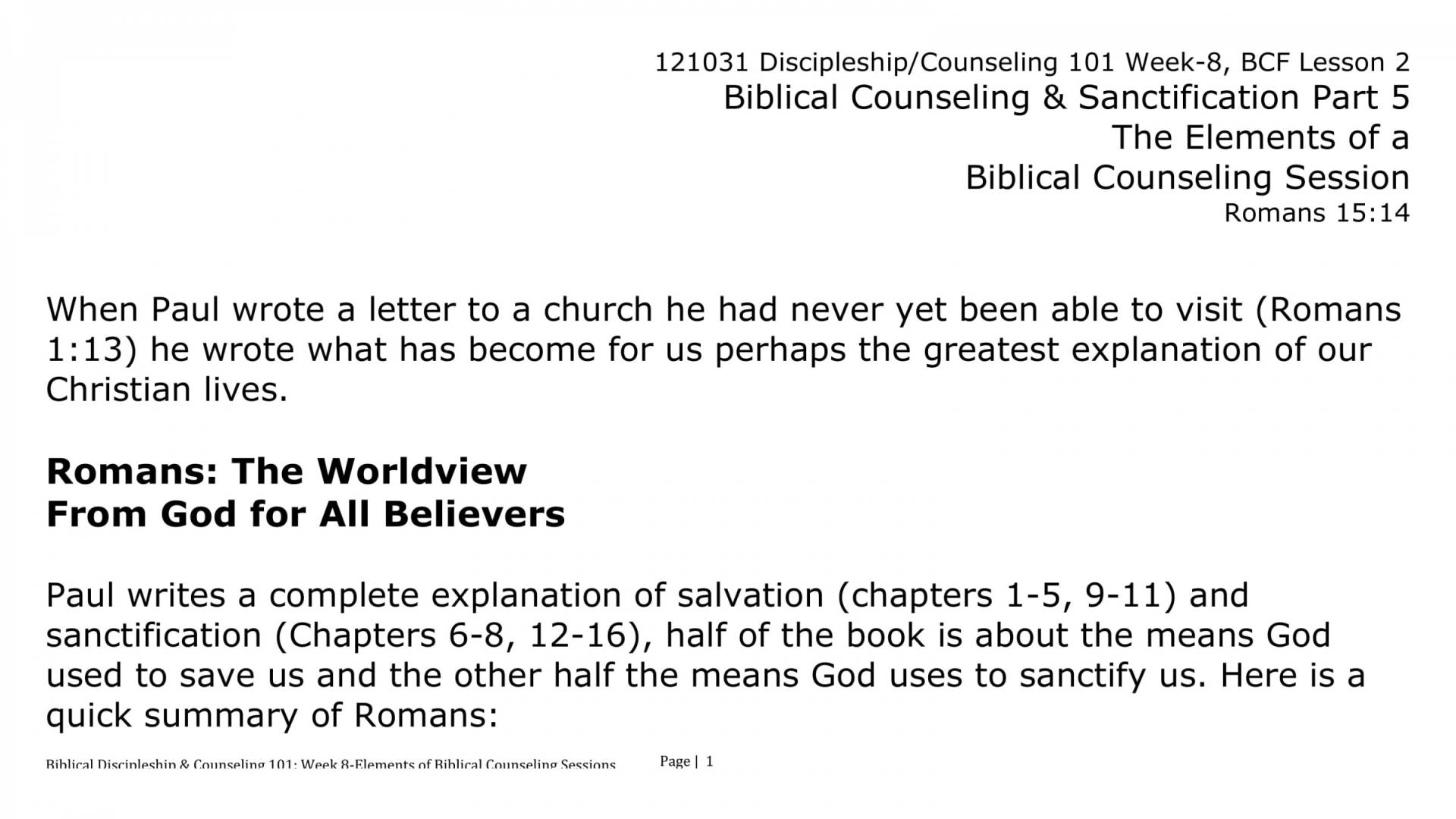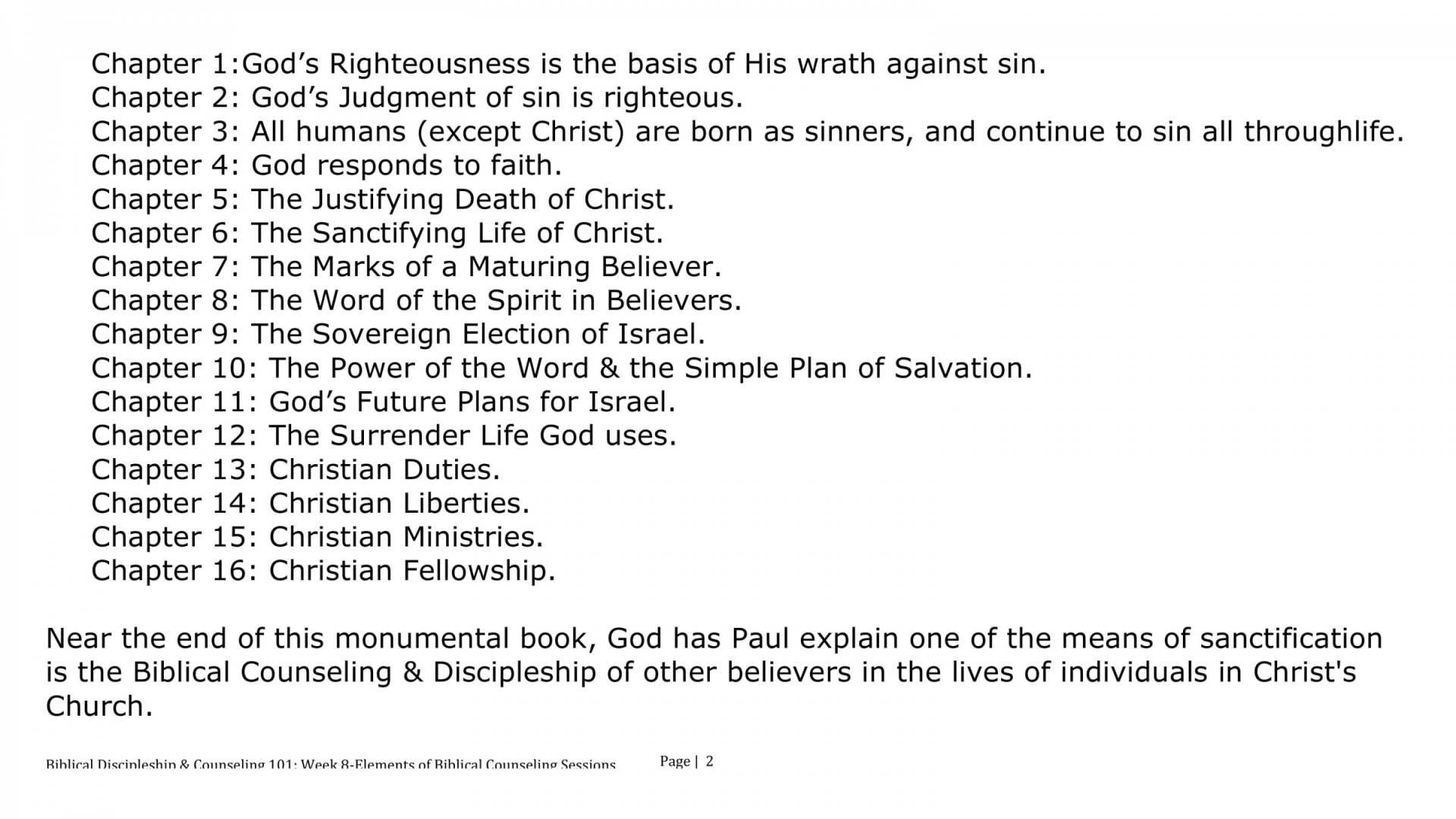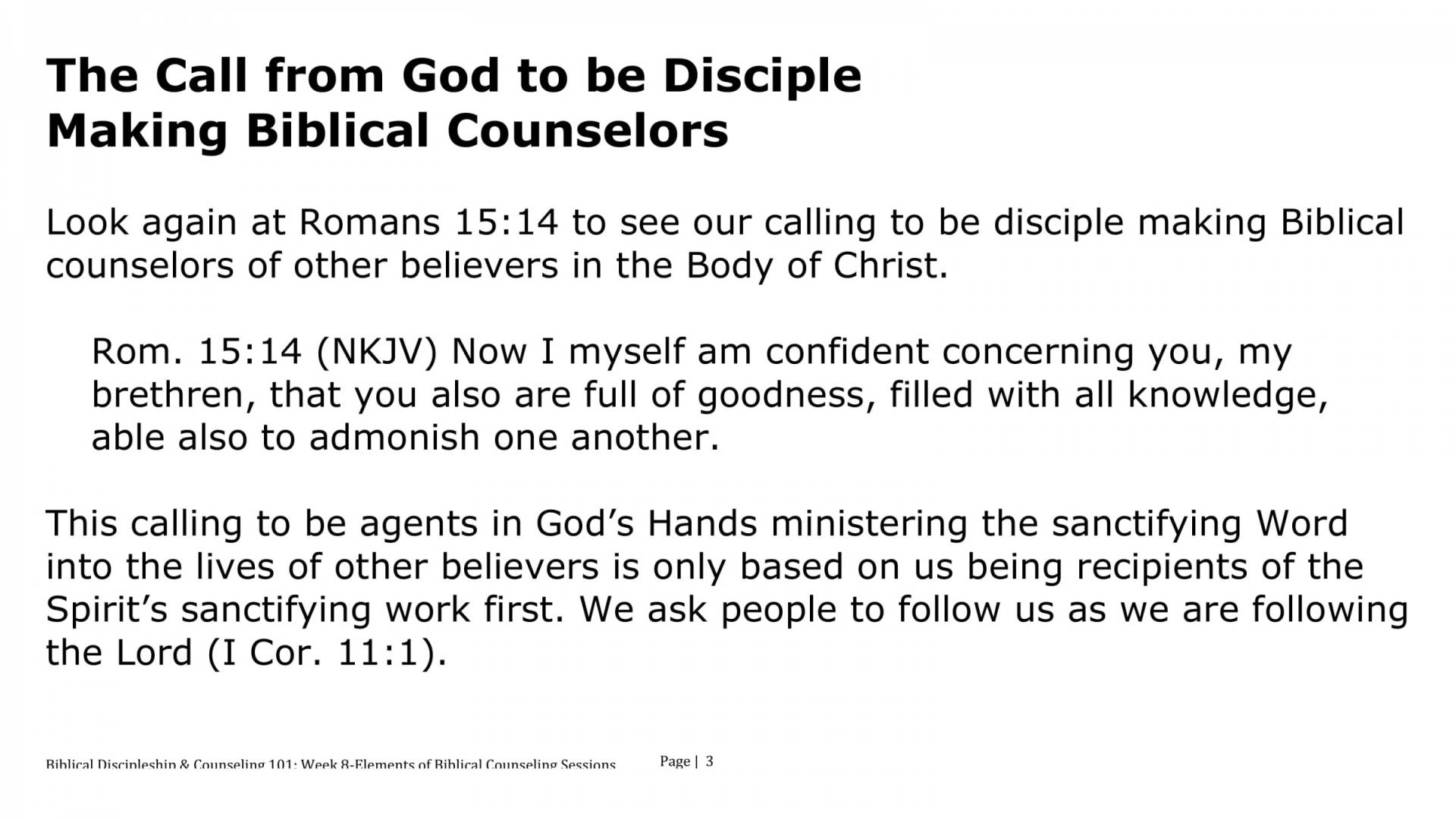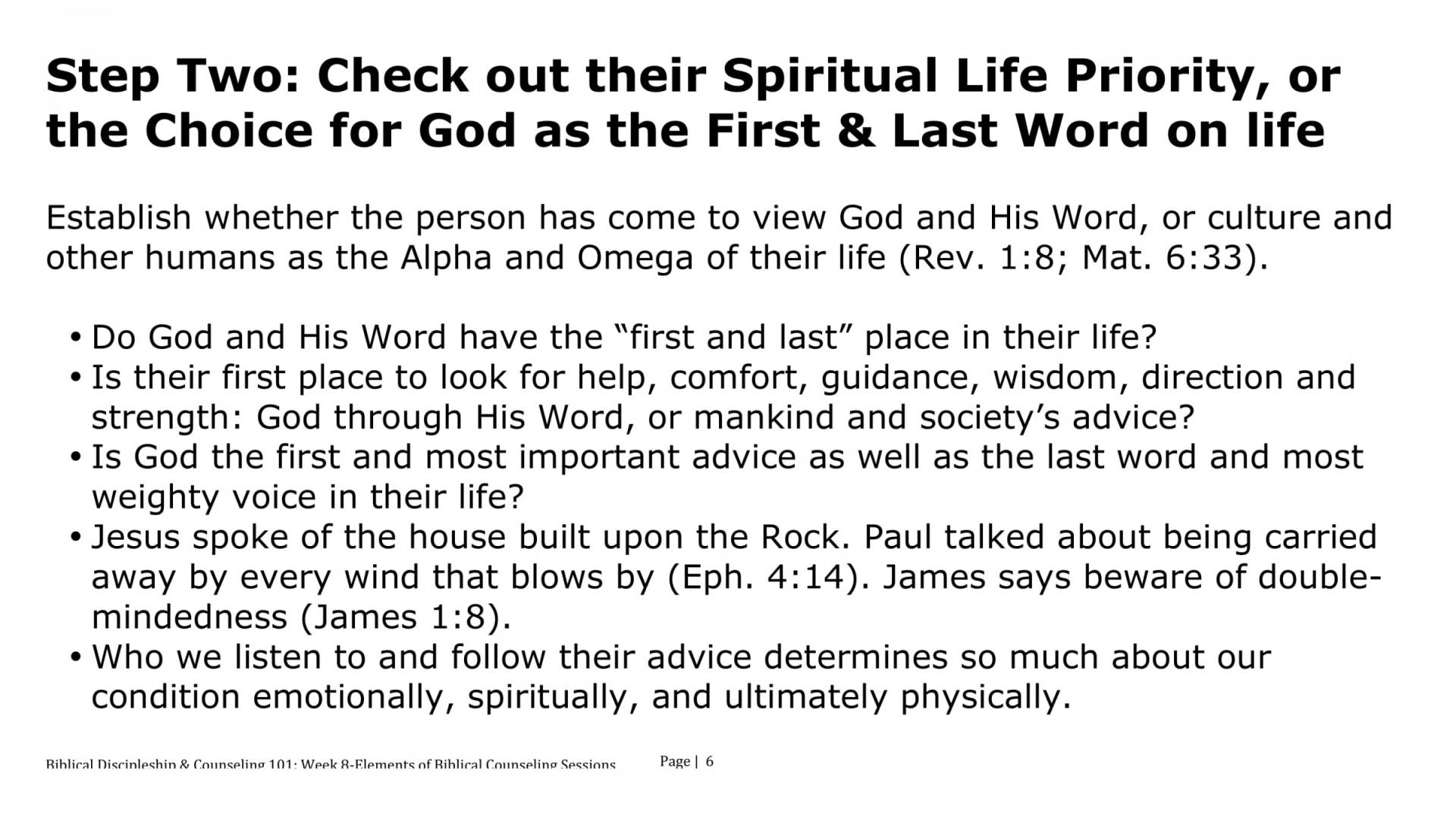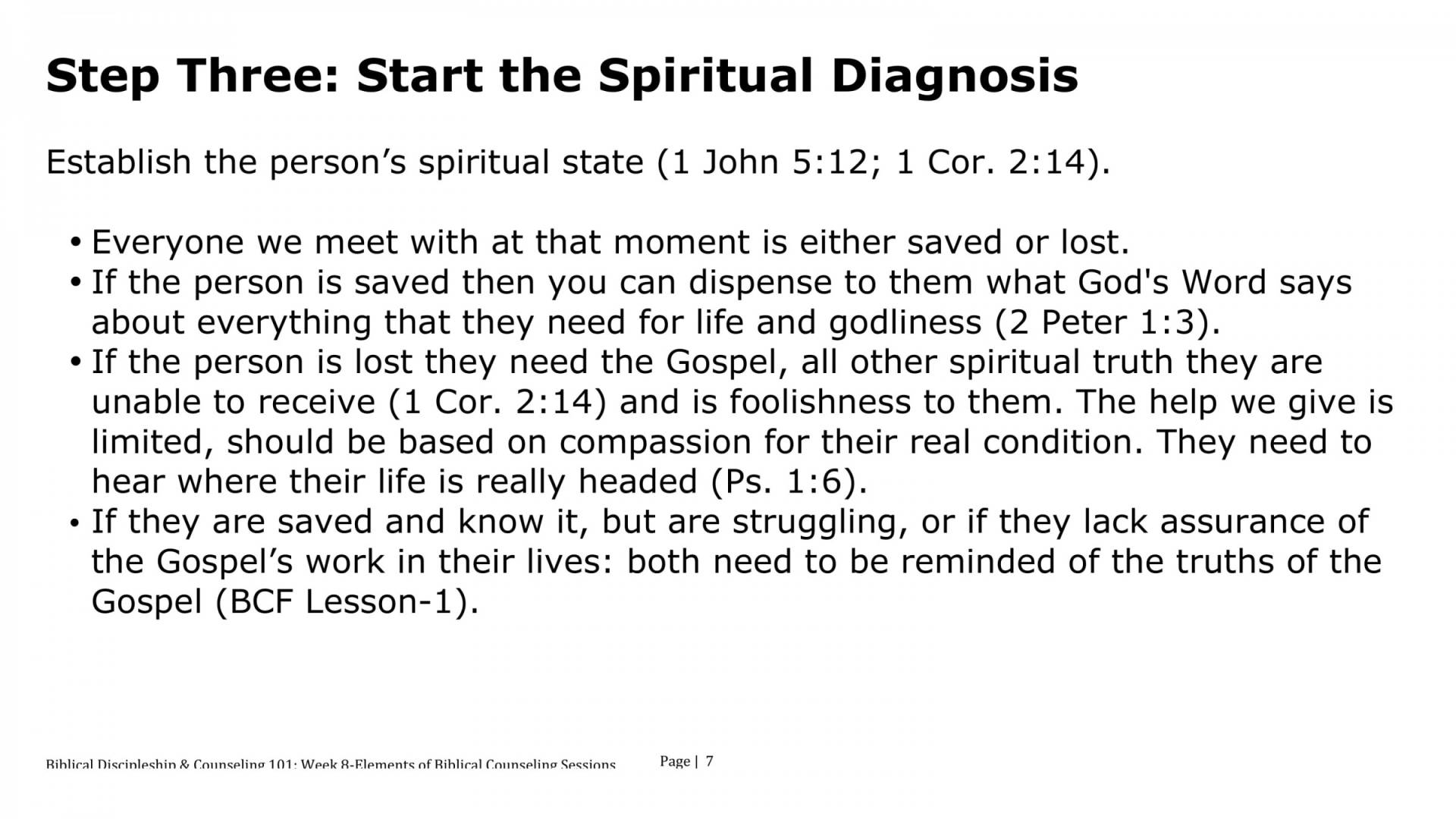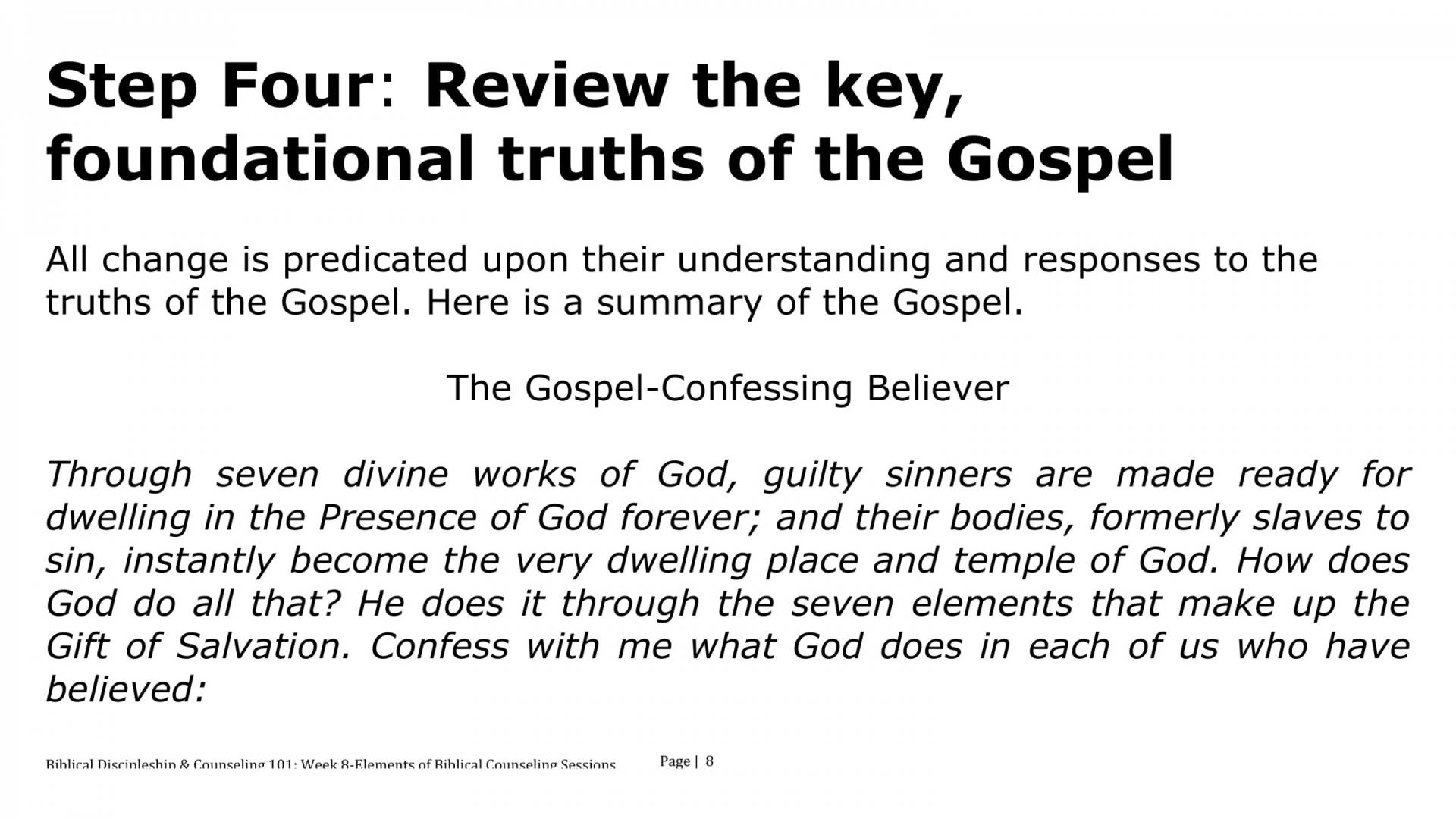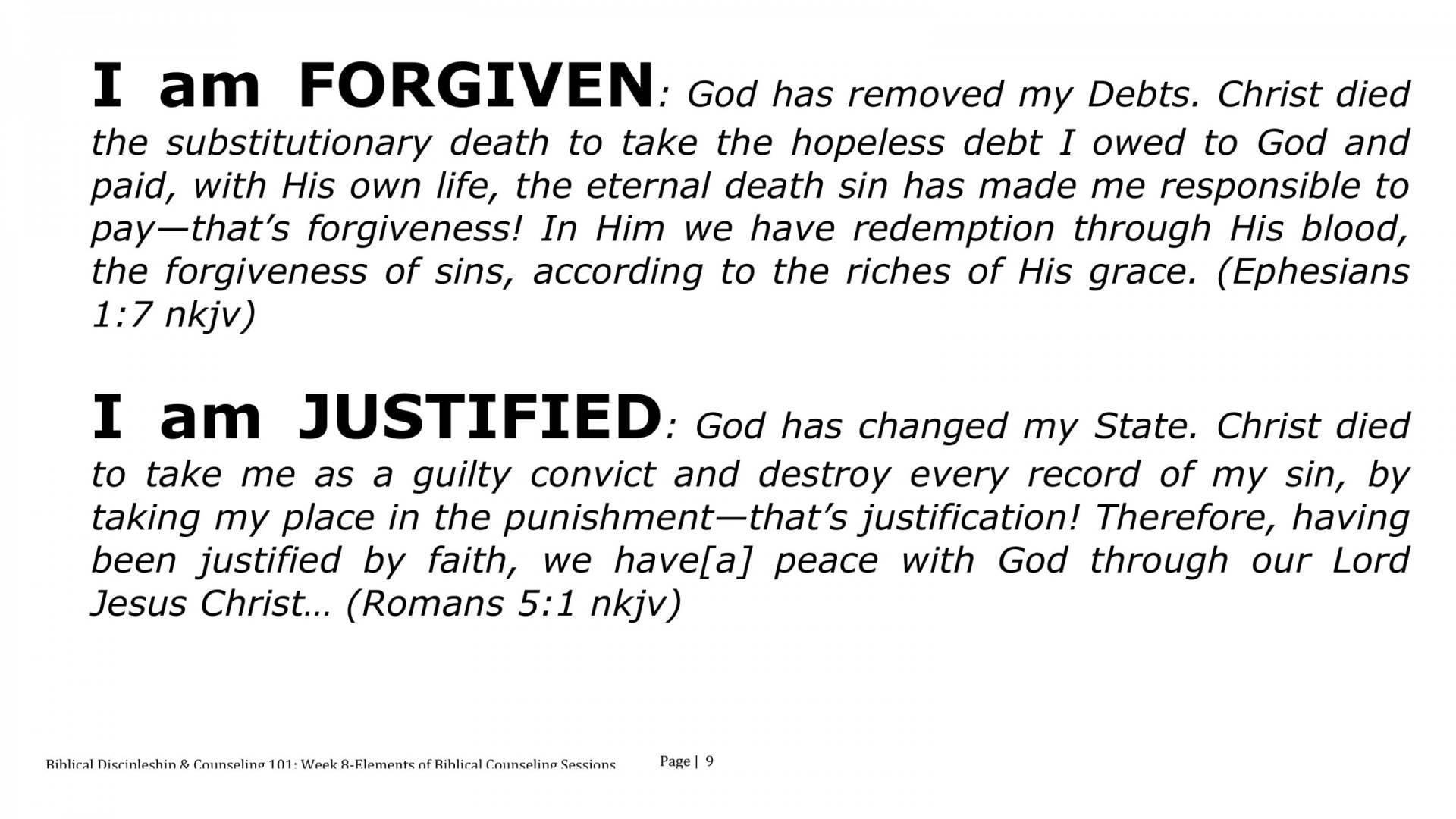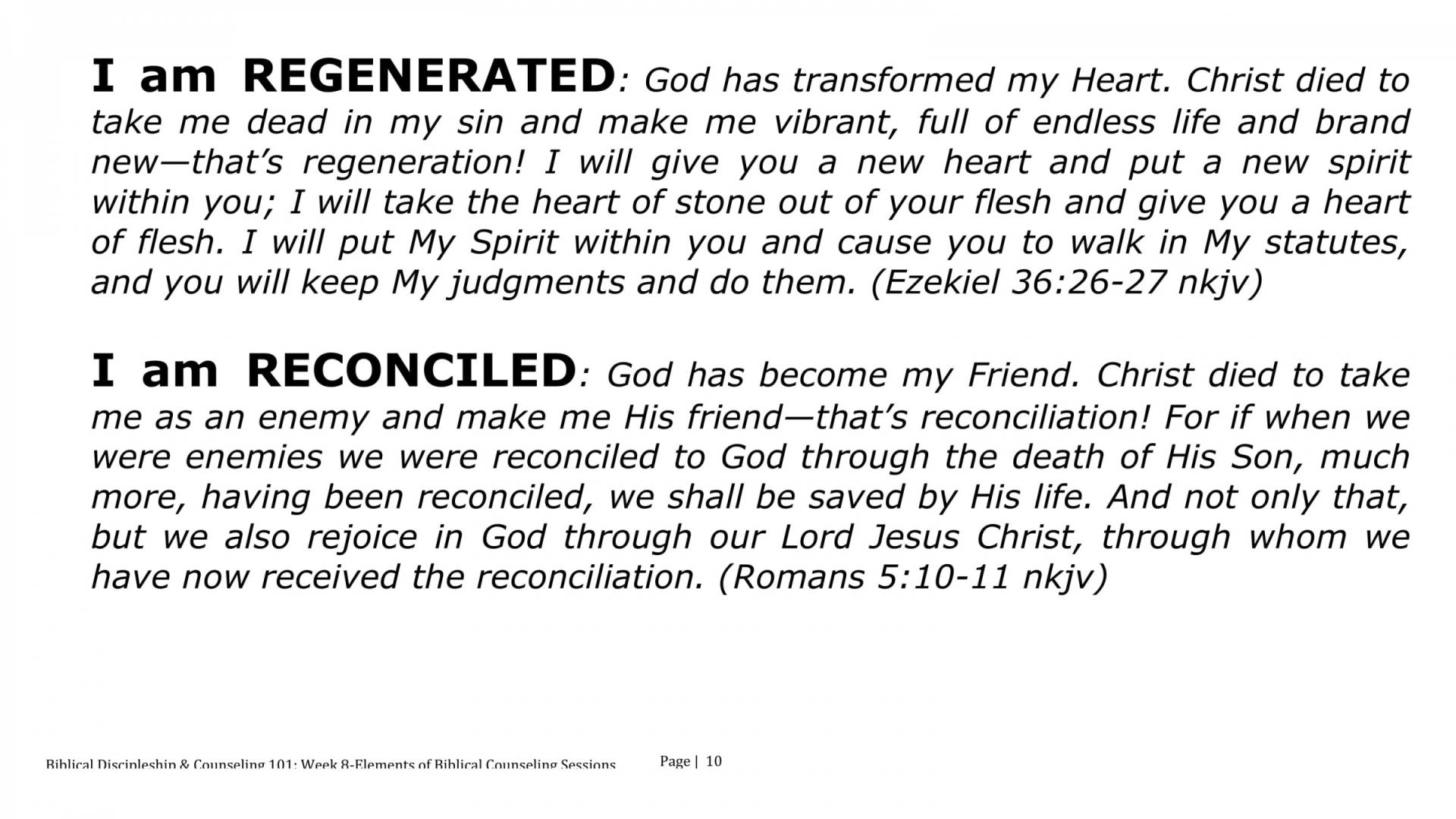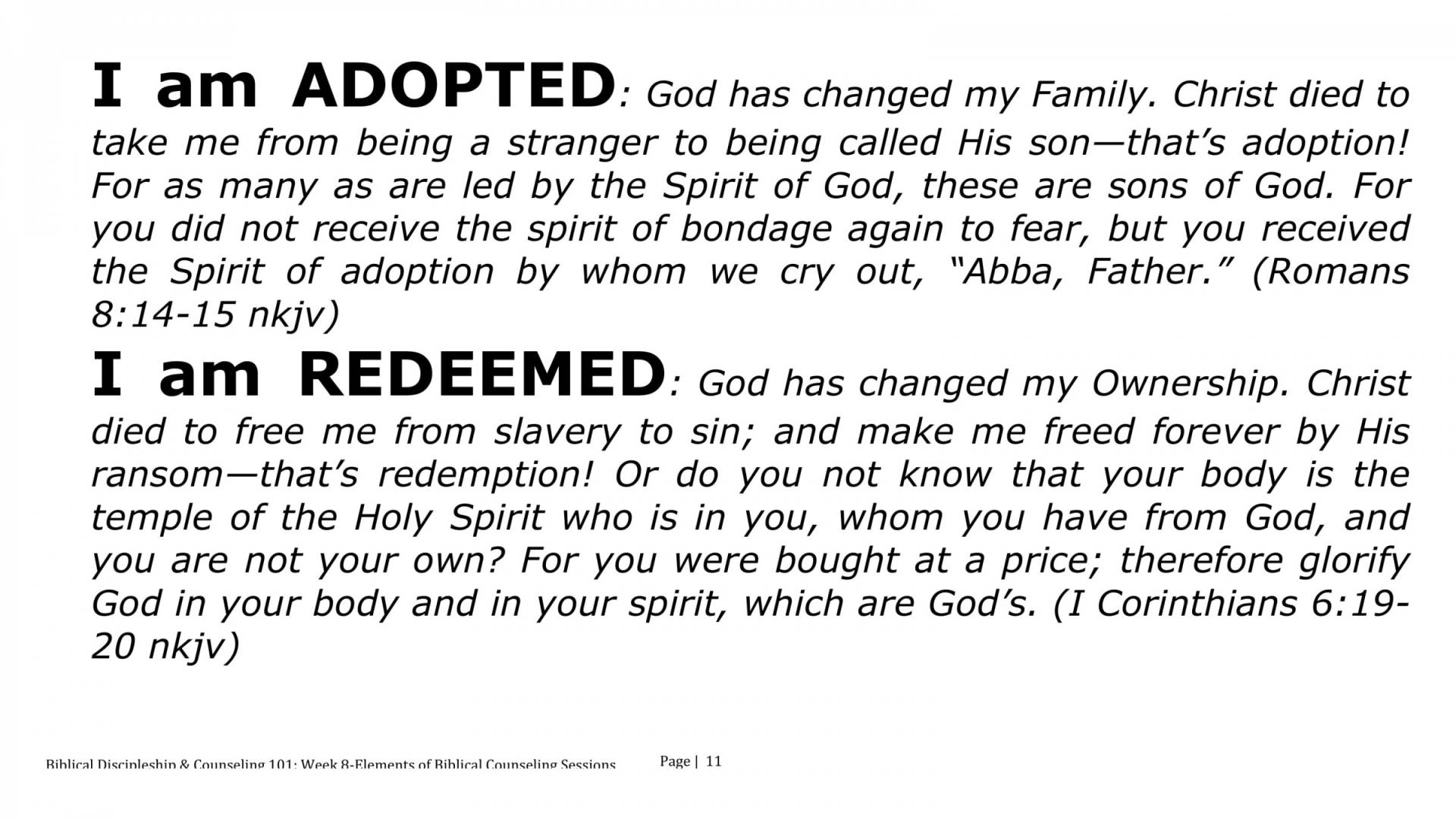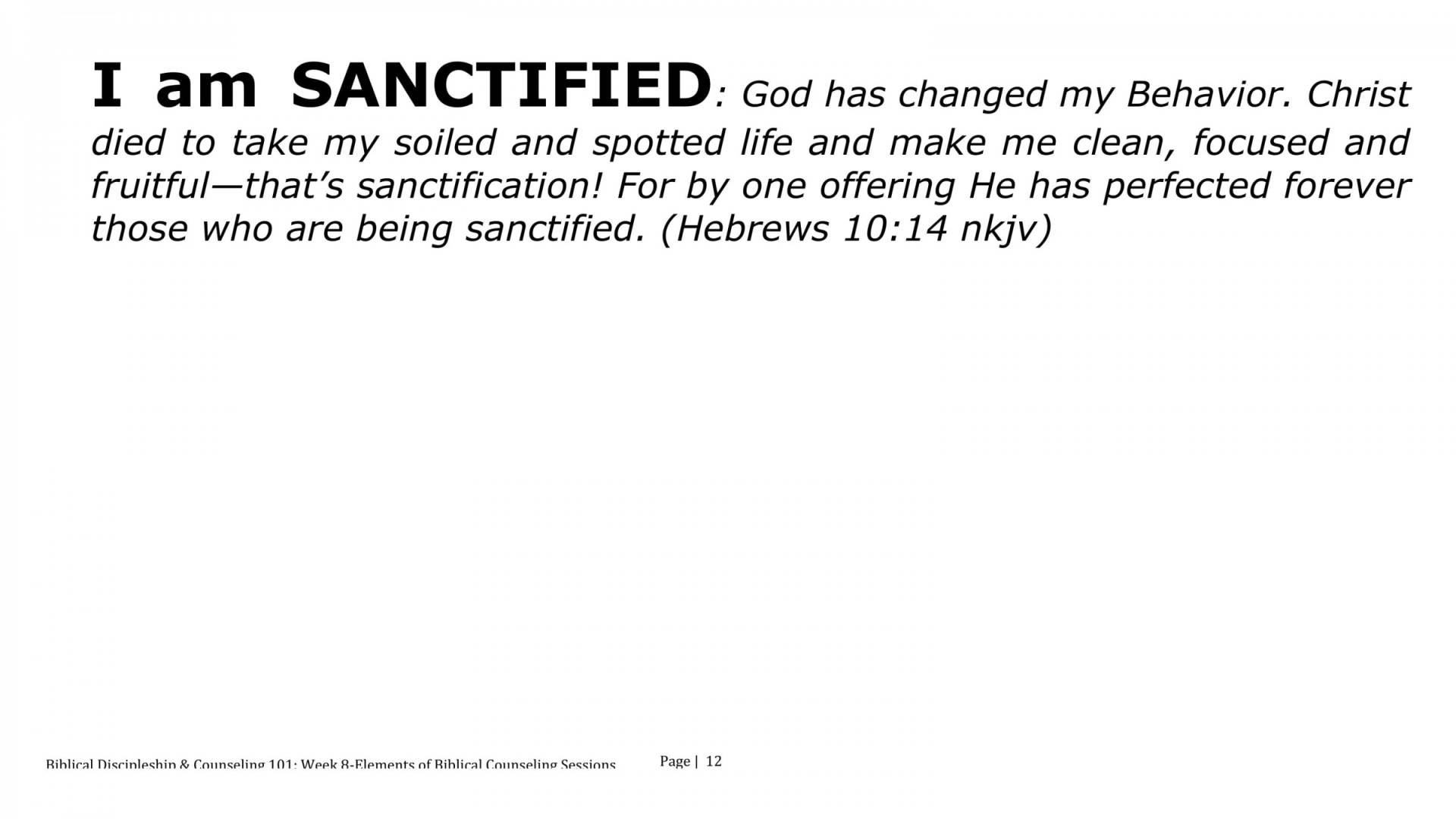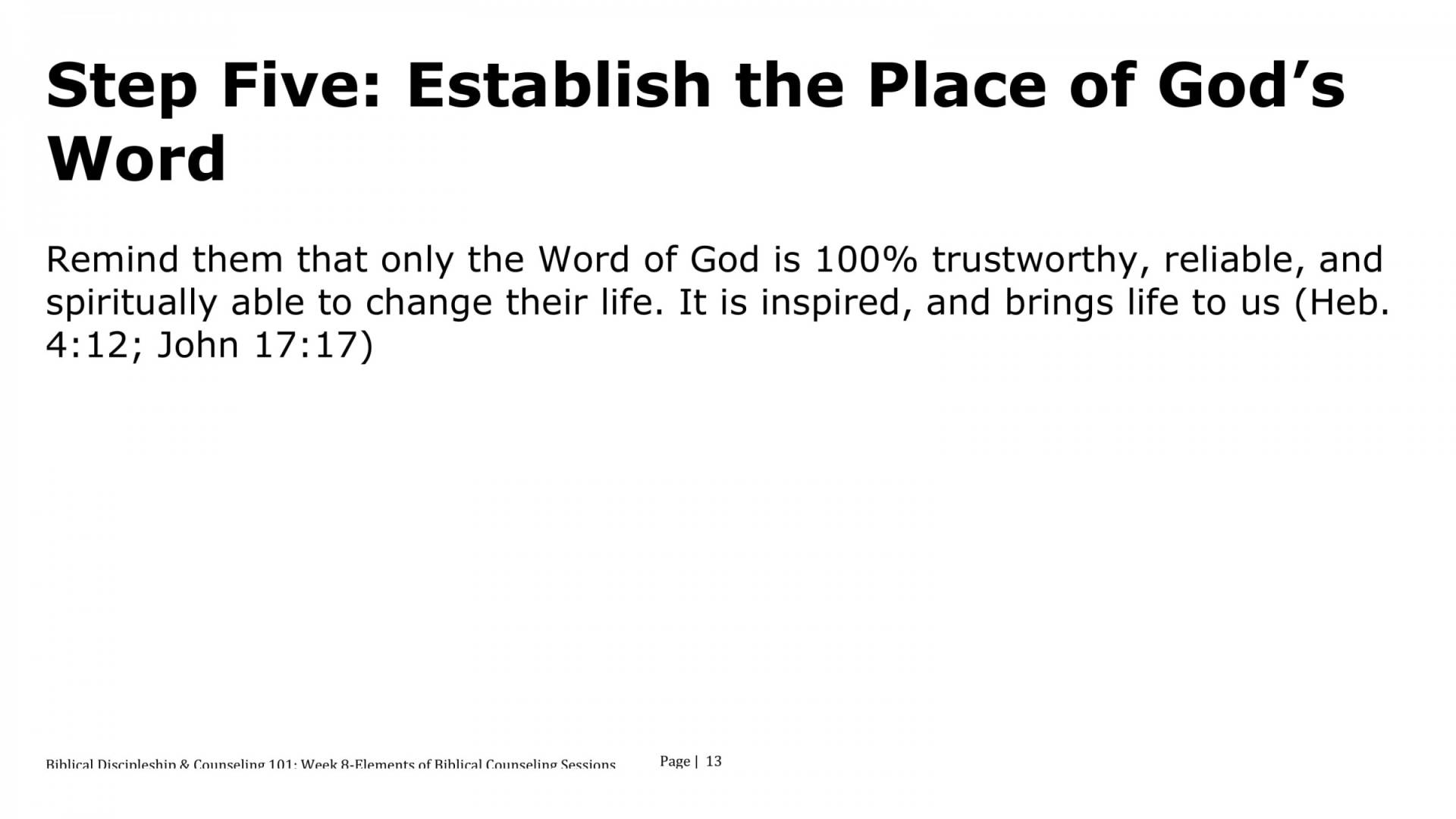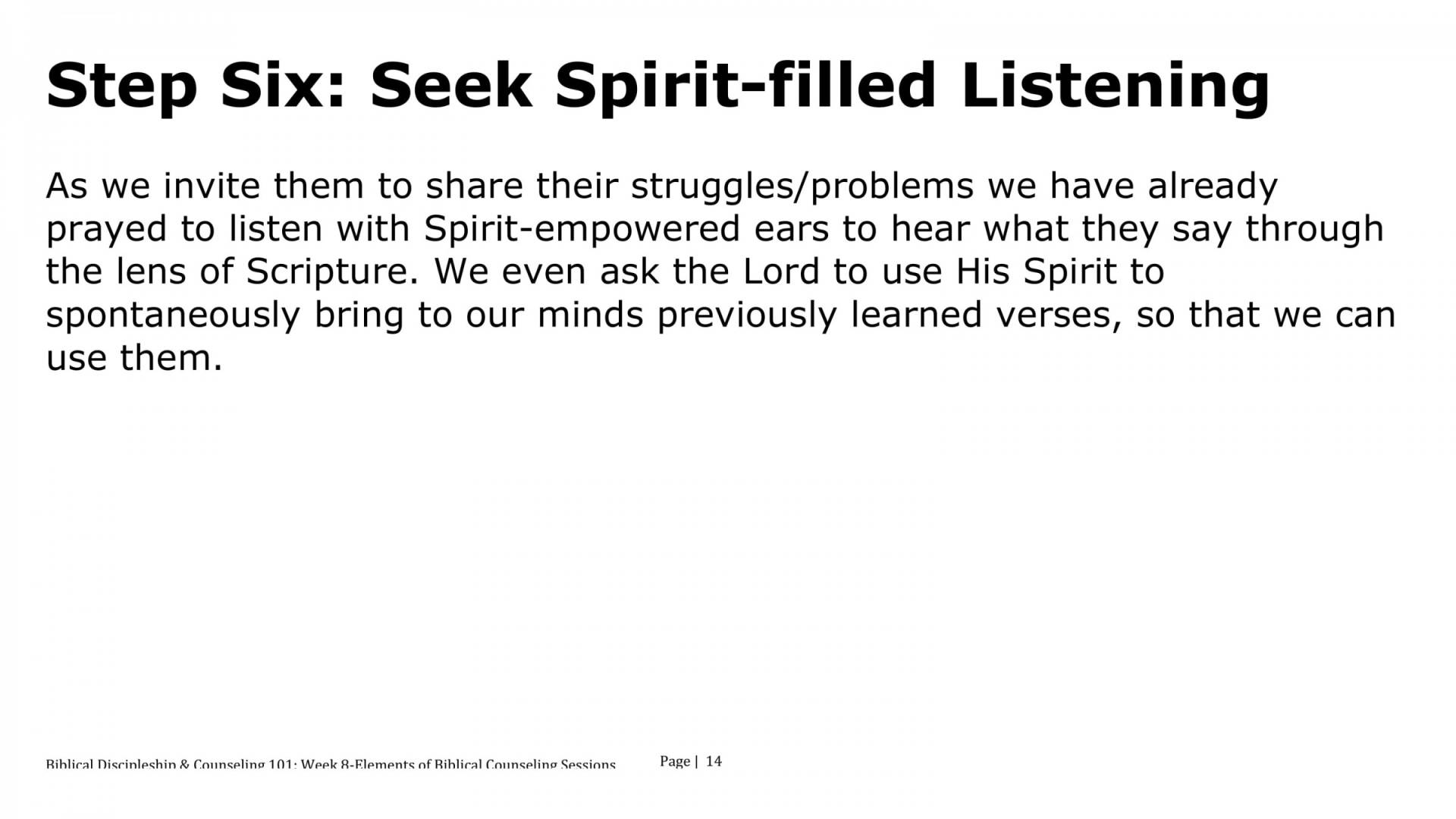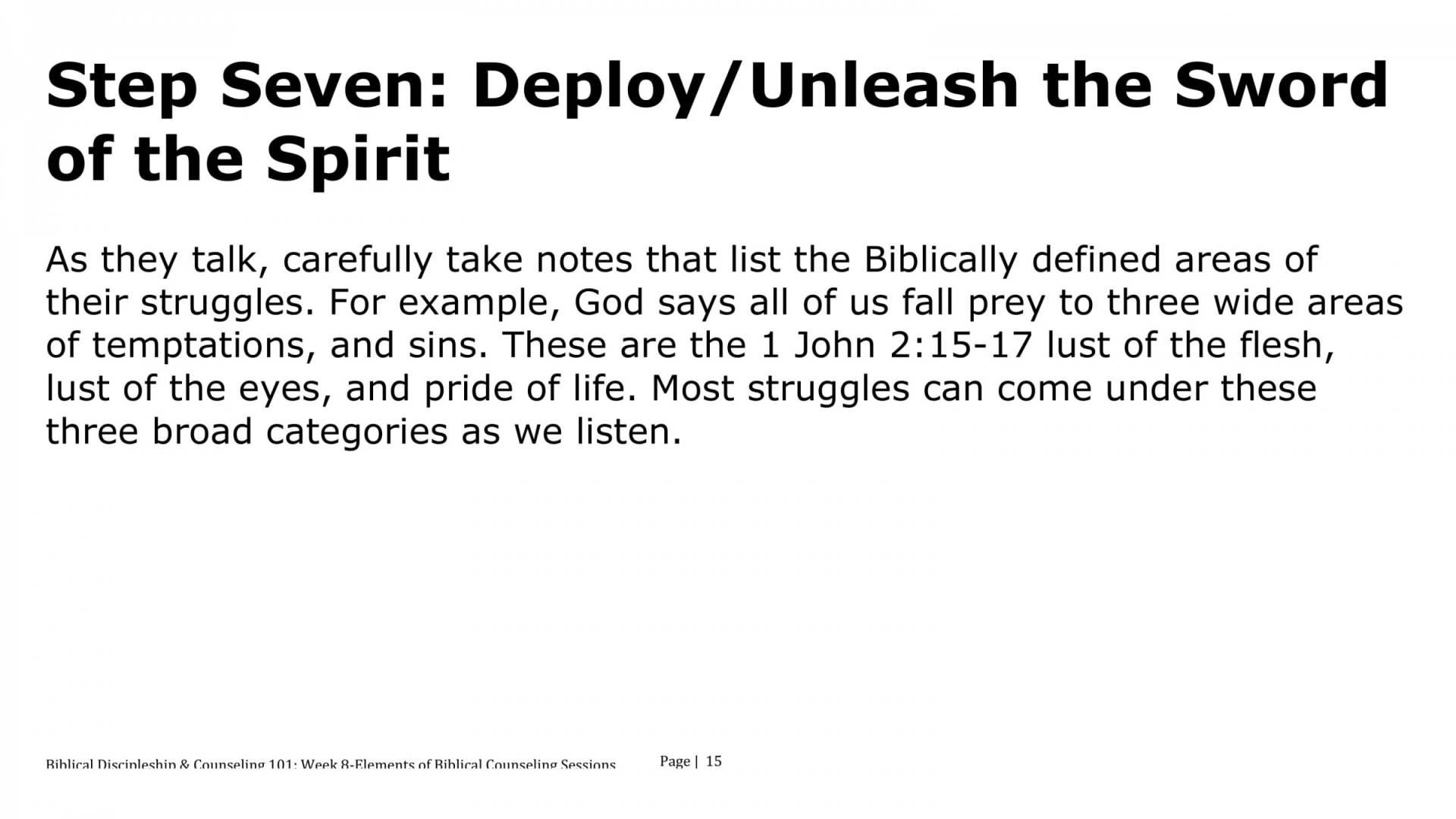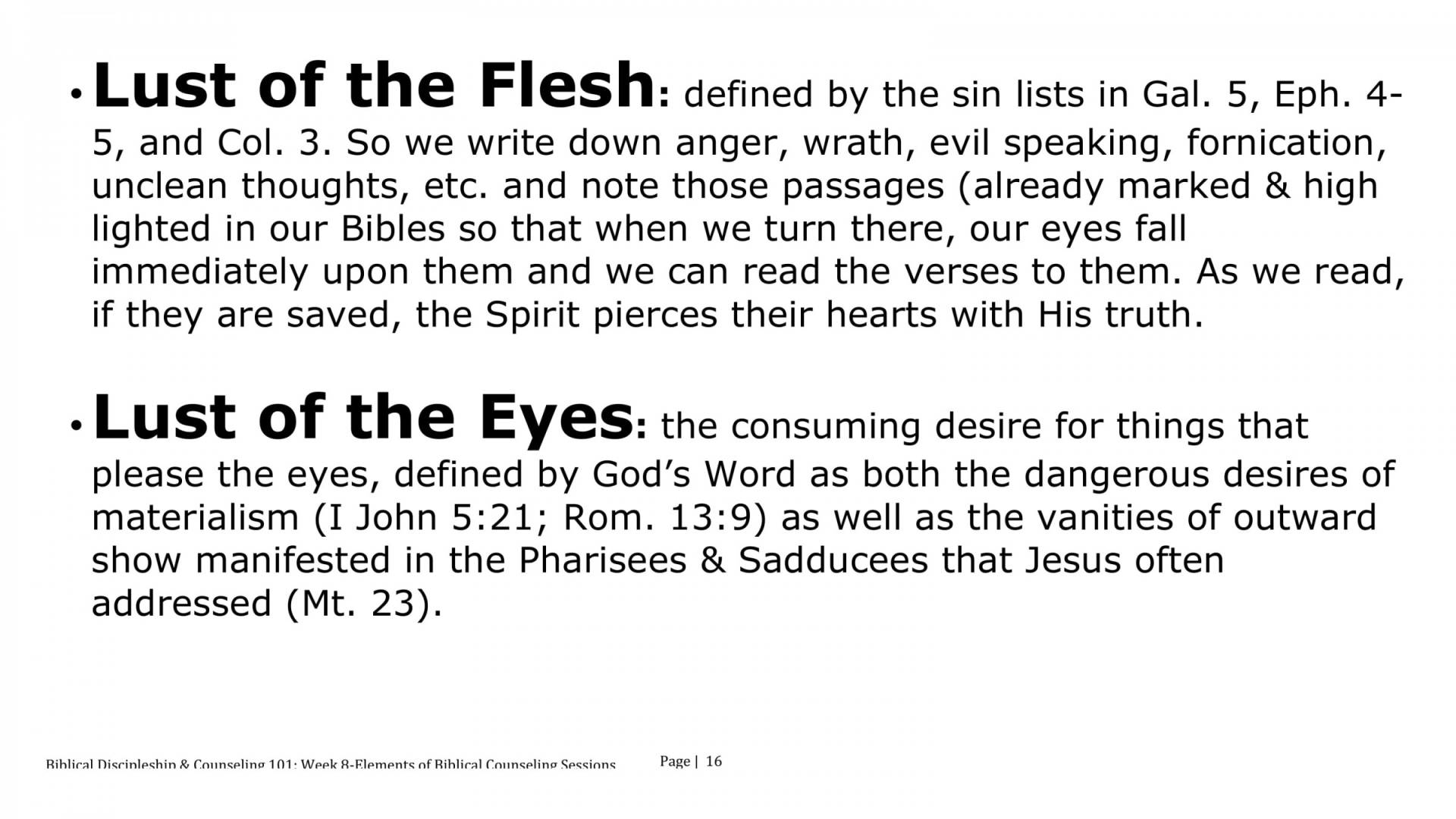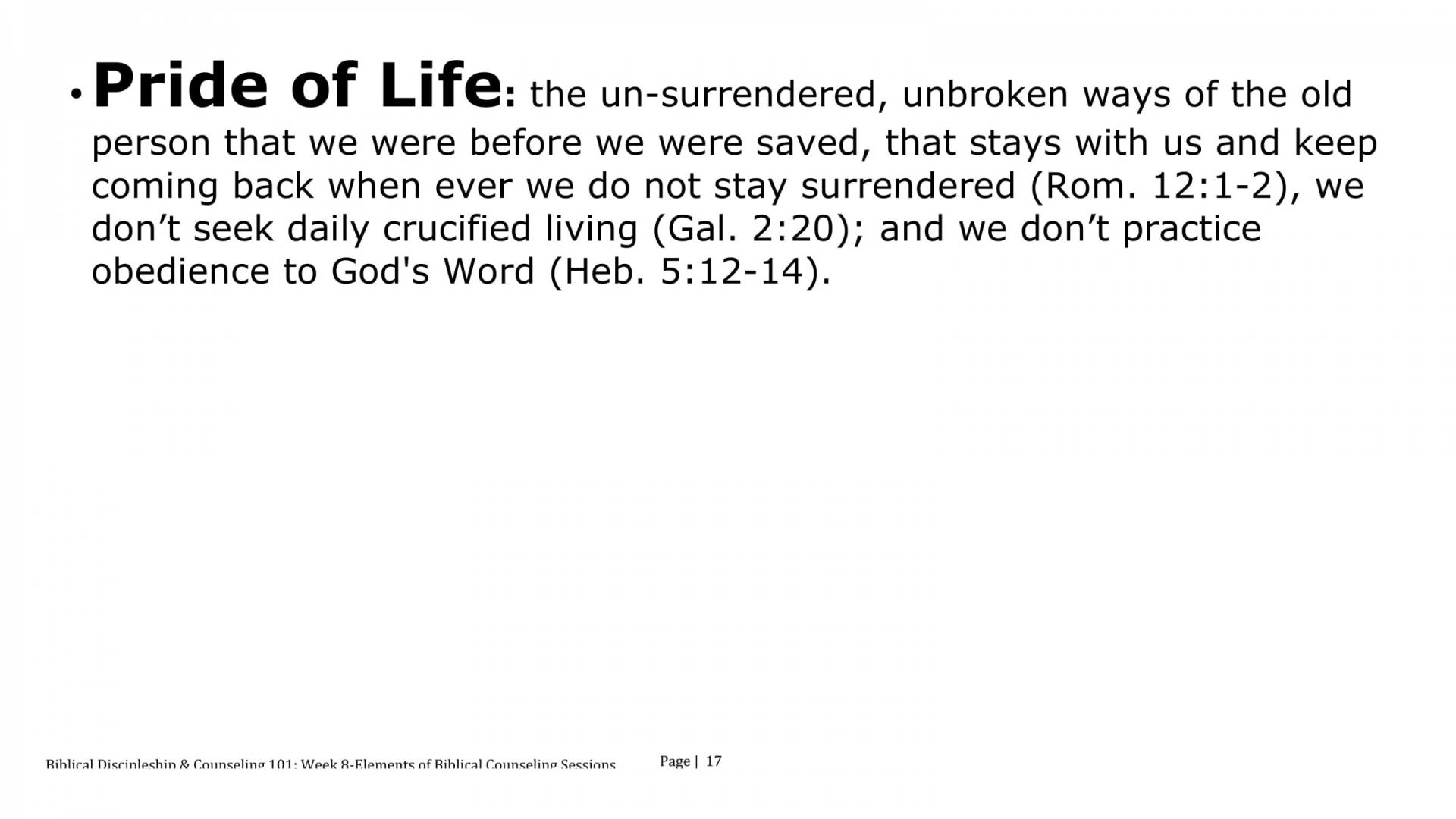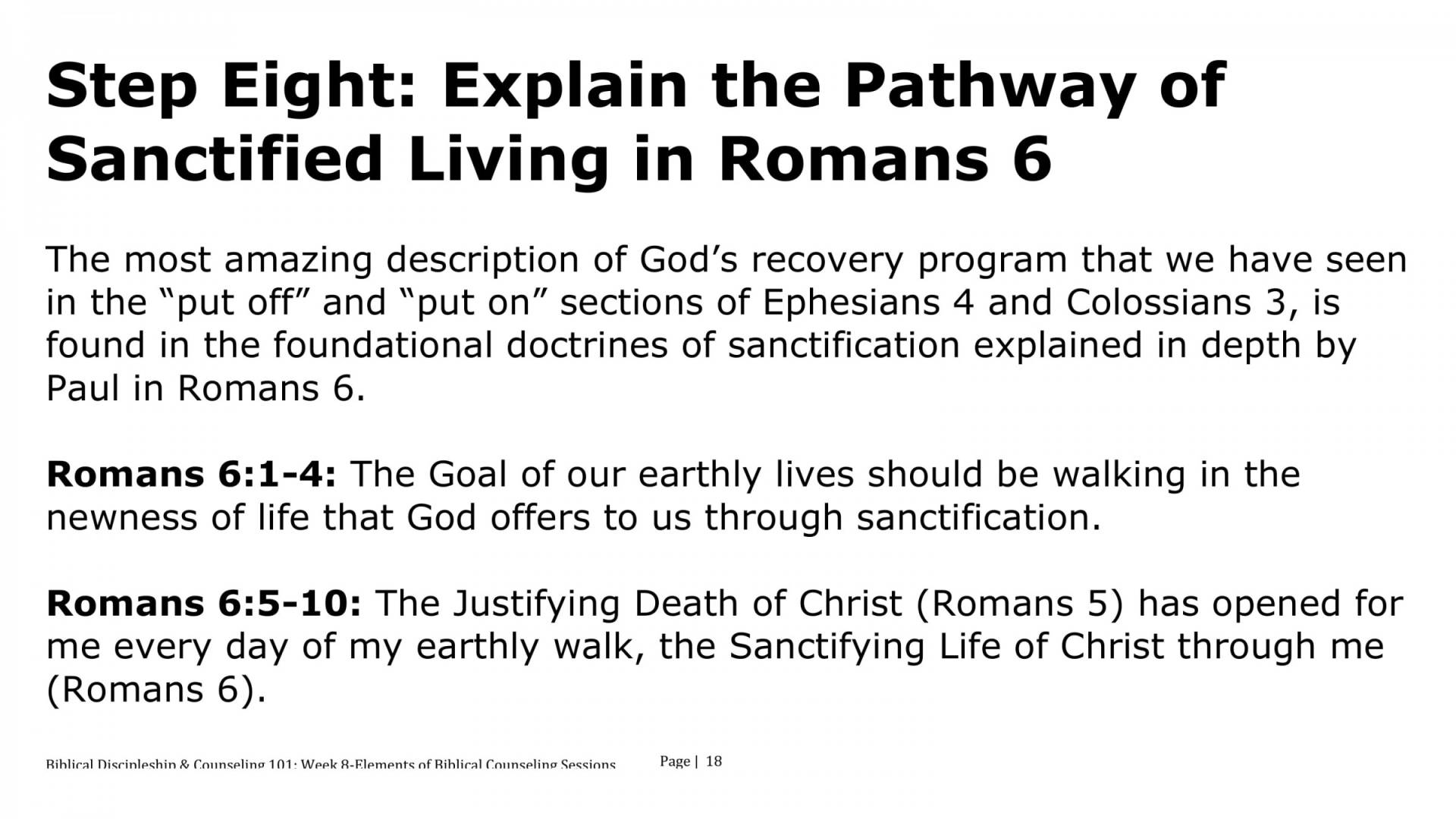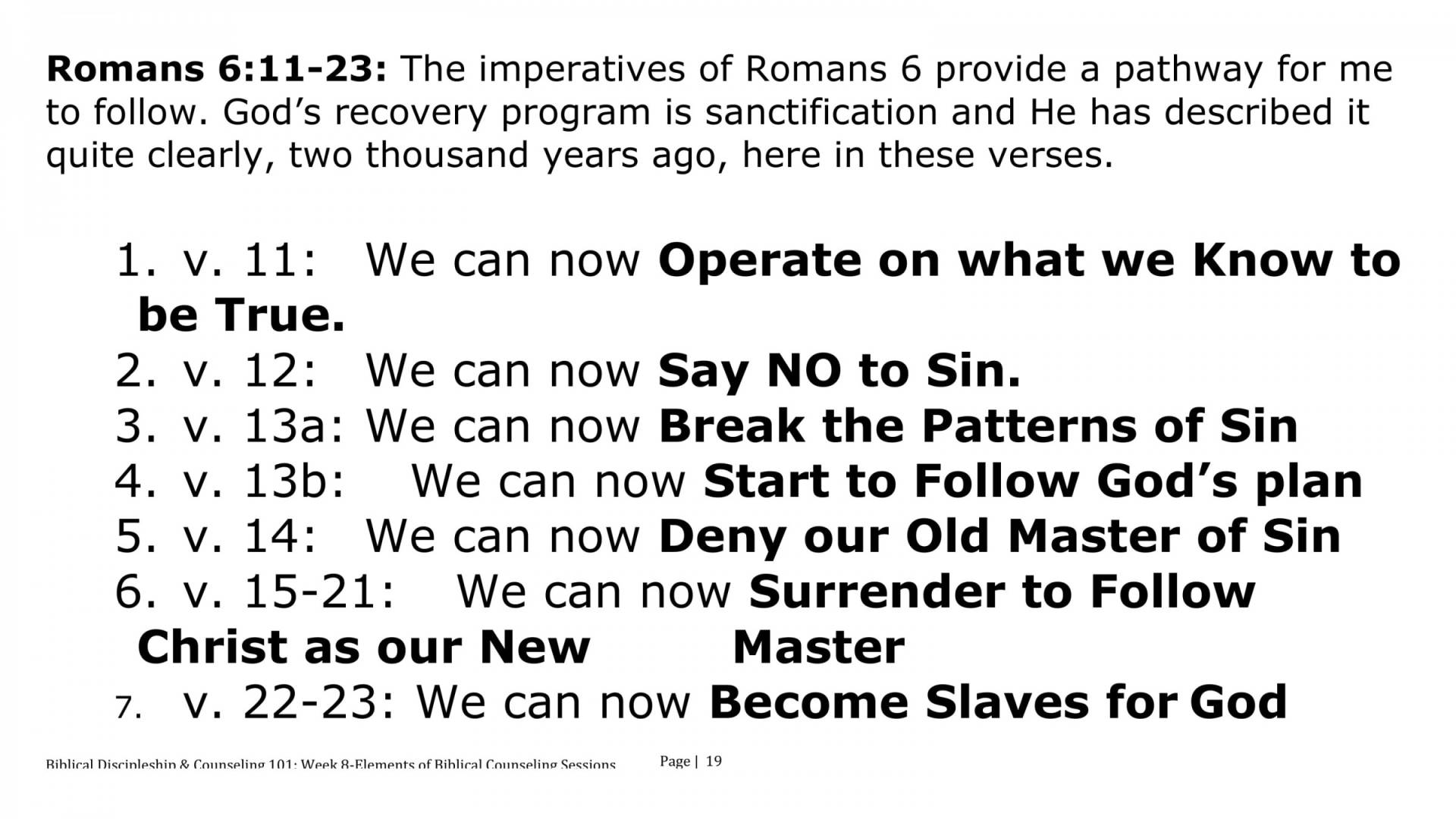Disciple Making Biblical Counselors
BC&D-08
121031WE
121031 Discipleship/Counseling 101 Week-8, BCF Lesson 2
Biblical Counseling & Sanctification Part 5
The Elements of a Biblical Counseling Session
Romans 15:14
When Paul wrote a letter to a church he had never yet been able to visit (Romans 1:13) he wrote what has become for us perhaps the greatest explanation of our Christian lives.
Romans: The Worldview From God for All Believers
Paul writes a complete explanation of salvation (chapters 1-5, 9-11) and sanctification (Chapters 6-8, 12-16), half of the book is about the means God used to save us and the other half the means God uses to sanctify us. Here is a quick summary of Romans:
Chapter 1:God’s Righteousness is the basis of His wrath against sin.
Chapter 2: God’s Judgment of sin is righteous.
Chapter 3: All humans (except Christ) are born as sinners, and continue to sin all through life.
Chapter 4: God responds to faith.
Chapter 5: The Justifying Death of Christ.
Chapter 6: The Sanctifying Life of Christ.
Chapter 7: The Marks of a Maturing Believer.
Chapter 8: The Word of the Spirit in Believers.
Chapter 9: The Sovereign Election of Israel.
Chapter 10: The Power of the Word & the Simple Plan of Salvation.
Chapter 11: God’s Future Plans for Israel.
Chapter 12: The Surrender Life God uses.
Chapter 13: Christian Duties.
Chapter 14: Christian Liberties.
Chapter 15: Christian Ministries.
Chapter 16: Christian Fellowship.
Near the end of this monumental book, God has Paul explain one of the means of sanctification is the Biblical Counseling & Discipleship of other believers in the lives of individuals in Christ’s Church.
The Call from God to be Disciple Making Biblical Counselors
Look again at Romans 15:14 to see our calling to be disciple making Biblical counselors of other believers in the Body of Christ.
Rom. 15:14 (NKJV) Now I myself am confident concerning you, my brethren, that you also are full of goodness, filled with all knowledge, able also to admonish one another.
This calling to be agents in God’s Hands ministering the sanctifying Word into the lives of other believers is only based on us being recipients of the Spirit’s sanctifying work first. We ask people to follow us as we are following the Lord (I Cor. 11:1).
The Elements of a Biblical Counseling Session
Now few come to the “How To” portion of this months lesson. How do we minister to others in a Biblical Discipleship & Counseling session? To explain this I am going to use a flow chart sequence and explain the “Elements of a Biblical Counseling Session”.
Step One: Determine Their Spiritual Orientation
Establish the person’s orientation about their spiritual life.
- God says we are an immortal spirit that lives within a temporal human body. We are waiting the time when we’ll be clothed upon with our celestial body when we see Christ and become like Him (I Cor. 15).
- Discuss whether the person you are counseling, sees themselves first temporally: as a physical body with an eternal spirit; or as an eternal spirit with a physical body.
- This orientation explains many facets of how we view life. If problems are seen in the long view of eternity, they are just a small part of the picture (Paul called life a “light, momentary affliction” 2 Cor. 4:17).
- Life lived looking downward at the decay or our bodies, the decline of our world, nation, and culture is always discouraging. But, looking up, seeing what God has said life will be like (full of “troubles” Job 5:7) and where all of history is heading (Rev. 6-19), and that all who are godly will suffer because we are headed in a different direction (2 Tim. 3:12).
Step Two: Check out their Spiritual Life Priority, or the Choice for God as the First & Last Word on life
Establish whether the person has come to view God and His Word, or culture and other humans as the Alpha and Omega of their life (Rev. 1:8; Mat. 6:33).
- Do God and His Word have the “first and last” place in their life?
- Is their first place to look for help, comfort, guidance, wisdom, direction and strength: God through His Word, or mankind and society’s advice?
- Is God the first and most important advice as well as the last word and most weighty voice in their life?
- Jesus spoke of the house built upon the Rock. Paul talked about being carried away by every wind that blows by (Eph. 4:14). James says beware of double-mindedness (James 1:8).
- Who we listen to and follow their advice determines so much about our condition emotionally, spiritually, and ultimately physically.
Step Three: Start the Spiritual Diagnosis
Establish the person’s spiritual state (1 John 5:12; 1 Cor. 2:14).
- Everyone we meet with at that moment is either saved or lost.
- If the person is saved then you can dispense to them what God’s Word says about everything that they need for life and godliness (2 Peter 1:3).
- If the person is lost they need the Gospel, all other spiritual truth they are unable to receive (1 Cor. 2:14) and is foolishness to them. The help we give is limited, should be based on compassion for their real condition. They need to hear where their life is really headed (Ps. 1:6).
- If they are saved and know it, but are struggling, or if they lack assurance of the Gospel’s work in their lives: both need to be reminded of the truths of the Gospel (BCF Lesson-1).
Step Four: Review the key, foundational truths of the Gospel
All change is predicated upon their understanding and responses to the truths of the Gospel. Here is a summary of the Gospel.
The Gospel-Confessing Believer
Through seven divine works of God, guilty sinners are made ready for dwelling in the Presence of God forever; and their bodies, formerly slaves to sin, instantly become the very dwelling place and temple of God. How does God do all that? He does it through the seven elements that make up the Gift of Salvation. Confess with me what God does in each of us who have believed:
I am FORGIVEN: God has removed my Debts. Christ died the substitutionary death to take the hopeless debt I owed to God and paid, with His own life, the eternal death sin has made me responsible to pay—that’s forgiveness! In Him we have redemption through His blood, the forgiveness of sins, according to the riches of His grace. (Ephesians 1:7 nkjv)
I am JUSTIFIED: God has changed my State. Christ died to take me as a guilty convict and destroy every record of my sin, by taking my place in the punishment—that’s justification! Therefore, having been justified by faith, we have[a] peace with God through our Lord Jesus Christ… (Romans 5:1 nkjv)
I am REGENERATED: God has transformed my Heart. Christ died to take me dead in my sin and make me vibrant, full of endless life and brand new—that’s regeneration! I will give you a new heart and put a new spirit within you; I will take the heart of stone out of your flesh and give you a heart of flesh. I will put My Spirit within you and cause you to walk in My statutes, and you will keep My judgments and do them. (Ezekiel 36:26-27 nkjv)
I am RECONCILED: God has become my Friend. Christ died to take me as an enemy and make me His friend—that’s reconciliation! For if when we were enemies we were reconciled to God through the death of His Son, much more, having been reconciled, we shall be saved by His life. And not only that, but we also rejoice in God through our Lord Jesus Christ, through whom we have now received the reconciliation. (Romans 5:10-11 nkjv)
I am ADOPTED: God has changed my Family. Christ died to take me from being a stranger to being called His son—that’s adoption! For as many as are led by the Spirit of God, these are sons of God. For you did not receive the spirit of bondage again to fear, but you received the Spirit of adoption by whom we cry out, “Abba, Father.” (Romans 8:14-15 nkjv)
I am REDEEMED: God has changed my Ownership. Christ died to free me from slavery to sin; and make me freed forever by His ransom—that’s redemption! Or do you not know that your body is the temple of the Holy Spirit who is in you, whom you have from God, and you are not your own? For you were bought at a price; therefore glorify God in your body and in your spirit, which are God’s. (I Corinthians 6:19-20 nkjv)
I am SANCTIFIED: God has changed my Behavior. Christ died to take my soiled and spotted life and make me clean, focused and fruitful—that’s sanctification! For by one offering He has perfected forever those who are being sanctified. (Hebrews 10:14 nkjv)
Step Five: Establish the Place of God’s Word
Remind them that only the Word of God is 100% trustworthy, reliable, and spiritually able to change their life. It is inspired, and brings life to us (Heb. 4:12; John 17:17)
Step Six: Seek Spirit-filled Listening
As we invite them to share their struggles/problems we have already prayed to listen with Spirit-empowered ears to hear what they say through the lens of Scripture. We even ask the Lord to use His Spirit to spontaneously bring to our minds previously learned verses, so that we can use them.
Step Seven: Deploy/Unleash the Sword of the Spirit
As they talk, carefully take notes that list the Biblically defined areas of their struggles. For example, God says all of us fall prey to three wide areas of temptations, and sins. These are the 1 John 2:15-17 lust of the flesh, lust of the eyes, and pride of life. Most struggles can come under these three broad categories as we listen.
- Lust of the Flesh: defined by the sin lists in Gal. 5, Eph. 4-5, and Col. 3. So we write down anger, wrath, evil speaking, fornication, unclean thoughts, etc. and note those passages (already marked & high lighted in our Bibles so that when we turn there, our eyes fall immediately upon them and we can read the verses to them. As we read, if they are saved, the Spirit pierces their hearts with His truth.
- Lust of the Eyes: the consuming desire for things that please the eyes, defined by God’s Word as both the dangerous desires of materialism (I John 5:21; Rom. 13:9) as well as the vanities of outward show manifested in the Pharisees & Sadducees that Jesus often addressed (Mt. 23).
- Pride of Life: the un-surrendered, unbroken ways of the old person that we were before we were saved, that stays with us and keep coming back when ever we do not stay surrendered (Rom. 12:1-2), we don’t seek daily crucified living (Gal. 2:20); and we don’t practice obedience to God’s Word (Heb. 5:12-14).
Step Eight: Explain the Pathway of Sanctified Living in Romans 6
The most amazing description of God’s recovery program that we have seen in the “put off” and “put on” sections of Ephesians 4 and Colossians 3, is found in the foundational doctrines of sanctification explained in depth by Paul in Romans 6.
Romans 6:1-4: The Goal of our earthly lives should be walking in the newness of life that God offers to us through sanctification.
Romans 6:5-10: The Justifying Death of Christ (Romans 5) has opened for me every day of my earthly walk, the Sanctifying Life of Christ through me (Romans 6).
Romans 6:11-23: The imperatives of Romans 6 provide a pathway for me to follow. God’s recovery program is sanctification and He has described it quite clearly, two thousand years ago, here in these verses.
- 11: We can now Operate on what we Know to be True.
- 12: We can now Say NO to Sin.
- 13a: We can now Break the Patterns of Sin
- 13b: We can now Start to Follow God’s plan
- 14: We can now Deny our Old Master of Sin
- 15-21: We can now Surrender to Follow Christ as our New Master
- 22-23: We can now Become Slaves for God
Slides
Check Out All The Sermons In The Series
You can find all the sermons and short clips from this series, Biblical Counseling & Discipleship Class here.
Looking To Study The Bible Like Dr. Barnett?
Dr. Barnett has curated an Amazon page with a large collection of resources he uses in his study of God’s Word. You can check it out here.

